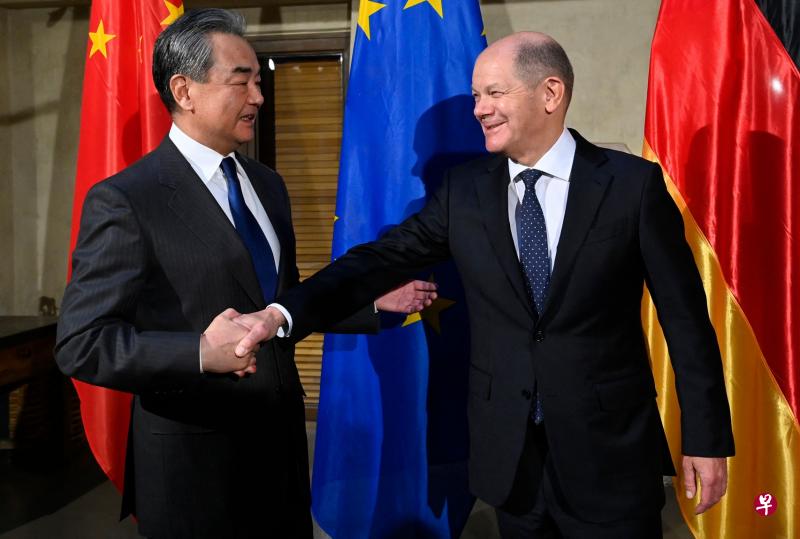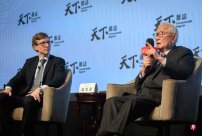
The Russian and Ukraine War ● Anniversary Symposium
After the Russian and Ukraine War officially broke out on February 24 last year, the United States and the European allies were rapidly integrated.The North Atlantic Convention, which was once described by French President Macron as the "death of the brain", has been rapidly integrated in the past year and has played an important role in assisting Ukraine.
The Russian and Ukraine War has been over the year to date. In addition to actively interacting with European countries, China has also strengthened relations with Russia.Scholars analyzed that this war made the European and American democratic camps more united, and it also increased the warning of EU countries to China. If Europe would really believe that China has military aid Russia in the future, it means that China will be officially regarded as a threat.
After the Russian and Ukraine War officially broke out on February 24 last year, the United States and the European allies were rapidly integrated.The North Atlantic Convention, which was once described by French President Macron as the "death of the brain", has been rapidly integrated in the past year and has played an important role in assisting Ukraine.
Beijing actively restores relations with EU countries
However, after the 20th National Congress of the Communist Party of China last year, Beijing actively restored its relationship with EU countries.For example, German Prime Minister Tsurtz led a group to visit China last November, and became the first leader of the Seven -way Group (G7) to visit Beijing since the outbreak of the crown disease epidemic.
On the eve of the first anniversary of the Russia and Ukraine War, Wang Yi, director of the Office of the Foreign Affairs Working Committee of the Central Committee of the Communist Party of China, has also visited France, Italy, Hungary, and went to Germany to participate in the Munich Security Conference since mid -February, explaining China to European countries.Position to the Russian and Ukraine War.
On the other hand, after Wang Yi visited Europe, he moved to Moscow and emphasized to Russian President Putin that Sino -Russian relations are as stable as Taishan and will not be affected by third -party pressure.
The New York Times this weekly analysis pointed out that China tries to repair relations with European countries, but it is facing "Russian problems."
During this time, the US Secretary of State Brillings and NATO Secretary -General Stoltenberg also warned that there were signs that China was providing Russian military assistance.This has also attracted the attention of France and Germany.
Yin Liqiao, a researcher at Harvard University Fei Zhengqing China Research Center Yin Liqiao on Friday (February 24), pointed out when attending the anniversary of the Russian and Ukraine War of the National Policy Research Institute in Taipei that this war gave the United States the opportunity to shape Sino -Russian shapes and shaped Sino -Russian shapeThe connection of the dictatorship camp has also caused European countries to notice China's threat to Europe.
He also mentioned that for China, there is no other power to cooperate in the Indo -Pacific region except Russia.Therefore, it is difficult for Beijing to open away from Moscow.
Yin Liqiao pointed out in an interview after the meeting that China ’s tried to play the Russian -U -U -wars mediationr was to a certain extent to differentiate the European and American camps.However, he believes that when Europe regards Russia as a clear strategic threat, China's mediation effect is probably not great, and the European and American democratic camps will not buy it.
Wang Hongren, a professor at the Political Department of Taiwan Chengcheng University, who also attended the symposium, said in a question from Lianhe Zaobao that when Wang Yi visited Russia, it emphasized that China and Russia have always maintained strategic determination, which means that Beijing will continue to develop the relationship with Moscow's relationship with Moscow.It will not affect the concerns of Europe and the United States.
He believes that Beijing's future direction of European policy may cooperate with economy as the primary purpose and negotiate with Europe under the premise of "pro -Russia and neutrality".
Wang Hongren pointed out that for EU countries, China is still not like Russia, and has a direct geopolitical threat. However, if the United States follows the evidence of Chinese military aid Russia and is identified by EU countries, then China is likely to be likelyIt is threatened by the EU.
However, Lin Zhengyi, a researcher at the European and American Institute of the Taiwan Central Research Institute, mentioned in the meeting that the protracted Russia -Ukraine War, in addition to triggering European security turmoil, rely more on Russia to rely on China, may also weaken the foundation of the U.S. Indo -Pacific strategy.
He believes that before the end of the Ukrainian war, it is difficult for the United States and NATO allies to use the Indo -Pacific region as the only and primary task; Russia may also be more willing to assist Beijing in the Indo -Pacific region to restrain Japan, the United States, and Taiwan.
Therefore, Lin Zhengyi judged that when the Russian and Ukraine War was dragged, the more it was not conducive to the implementation of the U.S. Indo -Pacific strategy.


